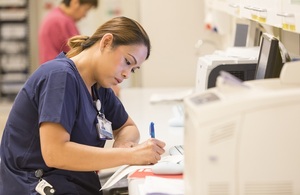One-off payments of up to £3,000 for over 27,000 health workers
Those in frontline roles such as community nurses and physiotherapists will benefit, with organisations receiving funding for the payments in the coming months.

- Tens of thousands of staff at non-NHS organisations including community nurses, physiotherapists and cleaners will soon receive 2 one-off payments
- Government recognises vital role of health workers at social enterprises, charities, private providers and local authorities to support patients and the NHS
- Wider pay deal covering majority of NHS workers is already benefiting over one million staff including nurses, paramedics and 999 call handlers
The government will provide funding for over 27,000 more healthcare workers in England to receive 2 one-off payments - worth at least £1,655 and up to £3,000 - in a major boost for the workforce.
Community nurses, sexual health workers, speech and language therapists, physiotherapists and other crucial frontline workers are all set to benefit. Organisations will receive funding for these payments over the coming months.
Forming part of the wider NHS pay deal, one of the payments was specifically intended to recognise the sustained pressure facing the health service and the extraordinary effort staff have made to meet the Prime Minister’s promise to cut waiting lists.
Significant progress has been made recently, with overall NHS waiting lists decreasing for 4 months in a row by a total of 192,000 - despite winter pressures and industrial action.
Retaining talented staff is central to the NHS Long Term Workforce Plan, and the government recognises the vital role played by staff in non-NHS organisations to support patients and the wider health service.
Health and Social Care Secretary Victoria Atkins said:
I hugely value the hard work of all our healthcare staff, and those working in non-NHS organisations offer vital support to patients.
I want to ensure that eligible staff receive these payments, which is why we chose to deliver this funding and why we have taken the decision to relax the financial eligibility criteria employers must meet.
It will ensure that hardworking staff and the organisations they work for can fully benefit from the NHS pay deal.
Last year, more than one million NHS staff on the Agenda for Change contract - which includes nurses, paramedics, 999 call handlers, midwives, security guards and cleaners - received 2 one-off payments alongside a 5% pay rise.
These payments originally only applied to those directly employed by NHS organisations. In November, the government launched a scheme to provide non-NHS organisations with funding to cover the cost of the one-off payments for their eligible staff on this occasion. The scheme is now complete and all organisations have been informed of their outcome.
The payments will be provided to organisations which deliver NHS and public health grant services who employ their staff on dynamically linked Agenda for Change contracts.
Employers were originally required to prove they had been negatively financially impacted by the pay deal, and that their staff were employed on dynamic Agenda for Change contracts.
However, the department has relaxed the original financial hardship criteria to make these payments possible. Following confirmation of their success, eligible organisations will be contacted by NHS England or the Department of Health and Social Care (DHSC) and provided with the funding as quickly as possible.
Background information
The NHS pay deal, agreed by NHS Staff Council in May, included 2 non-consolidated pay awards for 2022 to 2023.
These non-consolidated payments covered staff directly employed by NHS organisations (for example, permanent and fixed-term contracts) as set out in Annex 1 of the NHS Terms and Conditions of Service handbook on Agenda for Change terms on 31 March 2023. However, some staff in non Annex 1 organisations are contractually entitled to the payments, and therefore their employers were responsible for making these payments.
DHSC has now agreed additional funding for over 27,000 members of staff to receive these payments.